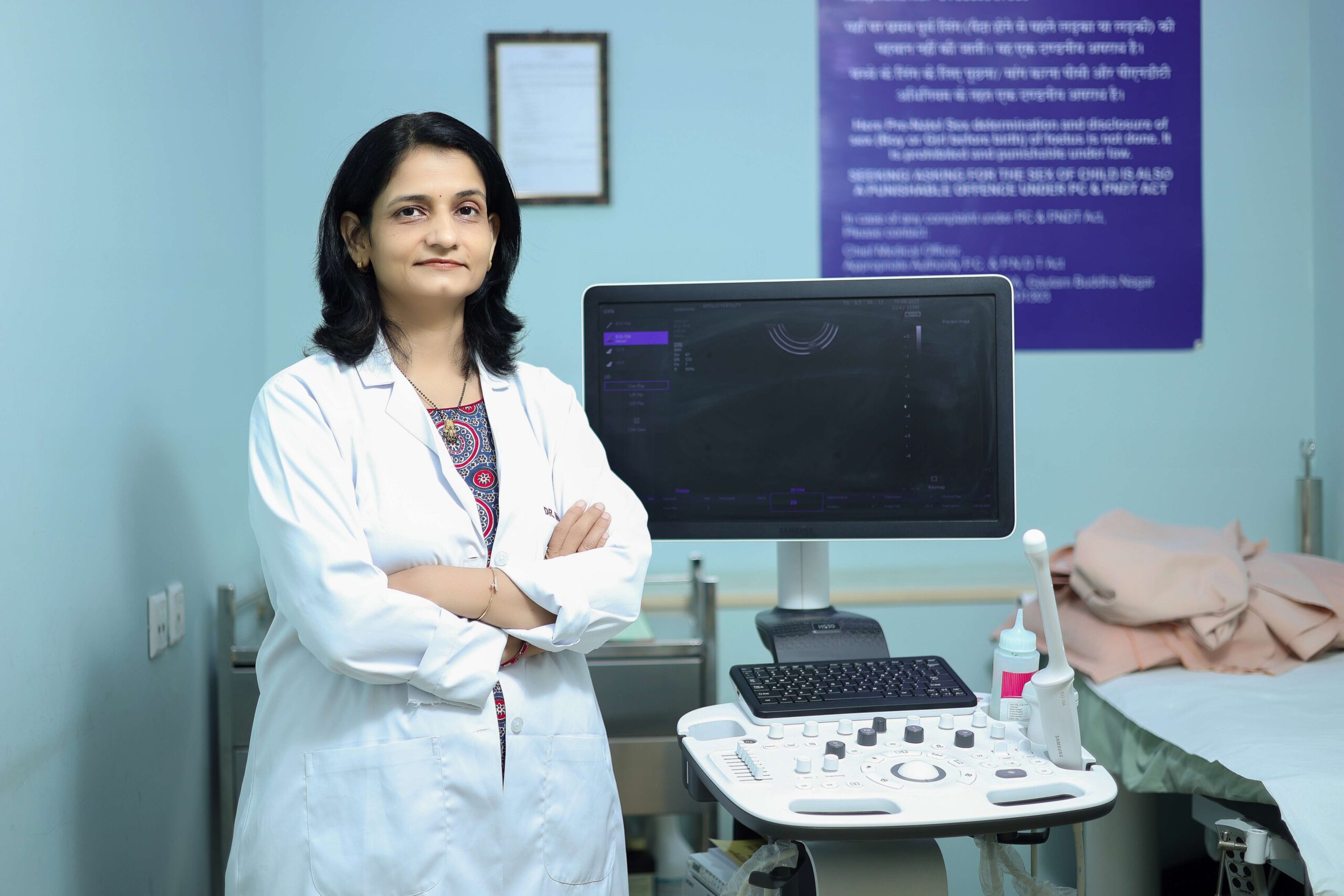Fertility Excellence for 25 Years
Low AMH Treatment
5000 Happy Parents Have Trusted Dr Mona Dahiya’s 25+ years of fertility expertise in making parenthood dreams a reality.
What is Low AMH?
Low AMH (Anti-Mullerian Hormone) is a critical marker used in assessing a woman’s ovarian reserve, indicating the quantity and quality of her eggs. This hormone is produced by the small follicles in the ovaries and is typically measured through a blood test. Low AMH levels can be a cause of concern for women trying to conceive as it may indicate a reduced number of eggs or diminished ovarian function.
Low AMH Tests
Diagnosing low AMH involves a simple blood test. This test measures the concentration of AMH in the bloodstream. A lower AMH level typically suggests a decreased ovarian reserve. The results are usually interpreted in ng/ml or pmol/l, with specific reference ranges established by laboratories and fertility specialists.
Types of Low AMH Treatment
Low AMH can present challenges for women aiming to become pregnant. Several treatment options are available to address this issue:
- Ovulation Stimulation: Ovulation stimulation is a common approach for women with low AMH levels. Fertility medications like Clomiphene citrate or Letrozole may be prescribed to encourage the growth of follicles and increase the chances of ovulation. This method is often combined with intrauterine insemination (IUI) to improve the likelihood of pregnancy.
- In Vitro Fertilization (IVF): IVF is a more intensive fertility treatment suitable for women with severely low AMH levels or other fertility issues. It involves stimulating the ovaries with hormonal medications to produce multiple eggs. These eggs are then retrieved, fertilized with sperm in a laboratory, and the resulting embryos are transferred to the uterus. IVF offers a higher success rate but is also more expensive and invasive.
- Egg Donation: In cases where a woman’s ovarian reserve is critically low, using donor eggs may be a viable option. This involves the use of eggs from a younger, healthy donor, which can significantly improve the chances of pregnancy. The donated eggs are fertilized with the partner’s or donor’s sperm through IVF, and the resulting embryos are implanted in the recipient’s uterus.
- Lifestyle Changes: While not a direct treatment, adopting a healthy lifestyle can positively impact fertility. Maintaining a balanced diet, managing stress, regular exercise, and avoiding harmful habits like smoking and excessive alcohol consumption can contribute to overall reproductive health.

Success Rate of Low AMH Treatment in Noida
The success rate of low AMH treatment in Noida, like in any other location, can vary depending on various factors, including the age of the woman, the underlying cause of low AMH, and the chosen treatment method. In general, younger women with low AMH may have a higher chance of success with treatments like ovulation stimulation and IVF.
In Noida, several well-established fertility clinics and hospitals offer specialized care for women with low AMH. These facilities have experienced fertility specialists who can provide personalized treatment plans based on individual needs.
However, it’s important to note that low AMH can still pose challenges, and success is not guaranteed. Women with severely diminished ovarian reserves may have a lower chance of achieving pregnancy using their own eggs and may need to explore alternative options like egg donation.
Low AMH Treatment Cost in Noida
The cost of low AMH treatment in Noida, as in other locations, can vary widely depending on the specific treatment method chosen, the clinic or hospital selected, and any additional procedures or medications required. Here’s a rough estimate of the costs associated with different low AMH treatments in Noida:
- Ovulation Stimulation (including medications and monitoring): ₹10,000 to ₹20,000 per cycle.
- In Vitro Fertilization (IVF): ₹100,000 to ₹200,000 per cycle.
- Egg Donation (including donor compensation): ₹200,000 to ₹300,000 or more.
- Lifestyle Changes: Costs may vary, but adopting a healthy lifestyle is a cost-effective measure.
Why Choose Us?
BEST IVF DOCTOR IN NOIDA

Treatment Options
Dr Mona Dahiya offers a diverse range of advanced infertility treatments tailored to individual needs. From IVF and IUI to fertility preservation, a comprehensive spectrum of options ensures personalized care for every patient.

Reviews of Patients
Patient testimonials from Our Satisfied Patients is a testimony of our assurance and confidence that reflects Dr Mona Dahiya’s excellence and compassionate approach. Our Satisfied patients are a testimony of our assurance and confidence.

Understanding
We prioritize deep understanding and empathy toward each patient’s emotional journey. We provide a supportive environment where concerns are heard and anxieties are eased for emotional Well-being.

Success Stories
We are proud of our success stories of Couples who have undergone infertility treatment. Our stories not only inspire hope but also exemplify our proficiency in turning dreams of parenthood into reality.

Tailor-Made Plans
Recognizing that every patient is unique, Dr. Mona Dahiya crafts personalized treatment plans. We consider medical history and individual circumstances to Guide Tailor Made Infertility Treatment Options.
Experience the Joy of Parenthood with the
Best IVF Center in Noida

Meet Our Fertility Specialist
Dr. Mona Dhaiya
Book Your Appointment
Benefits of Low AMH Treatment
Low Anti-Mullerian Hormone (AMH) levels can pose challenges for women trying to conceive, but seeking treatment can offer several benefits:
- Improved Fertility: One of the primary benefits of low AMH treatment is the potential for improved fertility. Various treatment options, such as ovulation stimulation and in vitro fertilization (IVF), aim to enhance the chances of conception by optimizing the growth and quality of eggs.
- Increased Pregnancy Rates: Treatment for low AMH can lead to increased pregnancy rates, especially when assisted reproductive techniques like IVF are employed. These methods can bypass some of the barriers posed by diminished ovarian reserve and increase the likelihood of a successful pregnancy.
- Enhanced Control and Monitoring: Low AMH treatment often involves close monitoring of a woman’s reproductive cycle. This allows healthcare providers to make real-time adjustments to the treatment plan, increasing the chances of success and minimizing potential risks.
- Personalized Care: Fertility specialists tailor treatment plans to each patient’s unique needs. This personalized approach ensures that the treatment aligns with the specific challenges posed by low AMH levels and other individual factors, maximizing its effectiveness.
- Emotional Support: Infertility and low AMH can be emotionally taxing. Treatment provides an opportunity for emotional support, whether through counseling, support groups, or the reassurance of having a dedicated healthcare team to guide and support you through the process.

Risks of Low AMH
While treatment for low AMH can offer numerous benefits, it’s essential to be aware of the potential risks and limitations associated with these treatments:
- No Guarantee of Success: Low AMH treatment does not guarantee pregnancy. Success rates can vary significantly among individuals, and in some cases, achieving pregnancy may still be challenging, particularly for those with severely diminished ovarian reserves.
- Emotional Stress: The emotional toll of fertility treatments should not be underestimated. The uncertainty, repeated procedures, and potential disappointments can lead to significant emotional stress. It’s crucial for individuals undergoing treatment to have a support system in place.
- Financial Costs: Fertility treatments, including those for low AMH, can be expensive. Costs may include medications, procedures, monitoring, and more. Financial considerations can be a significant source of stress for couples seeking treatment.
- Multiple Births: In some cases, fertility treatments may result in multiple pregnancies, increasing the risk of complications for both the mother and babies. This risk needs to be carefully managed and discussed with healthcare providers.
- Ovarian Hyperstimulation Syndrome (OHSS): OHSS is a potential side effect of fertility treatments, particularly with IVF. It can lead to bloating, abdominal pain, and, in severe cases, fluid accumulation in the abdomen and chest. Monitoring and management are essential to reduce the risk of OHSS.
Why Choose Dr. Mona Dahiya for Low AMH Treatment in Noida?
Choosing the right healthcare provider for low AMH treatment is crucial for the success and comfort of the patient. Dr. Mona Dahiya stands out as an excellent choice for several reasons:
- Expertise and Experience: Dr. Mona Dahiya is a highly experienced fertility specialist with a wealth of expertise in treating low AMH and various other fertility issues. Her extensive knowledge ensures that patients receive the most up-to-date and effective treatments.
- Comprehensive Care: Dr. Dahiya offers comprehensive care, guiding patients through every step of their fertility journey. From initial assessments to treatment planning and follow-up, she ensures that patients are well-informed and supported throughout the process.
- Personalized Treatment Plans: Recognizing that every patient is unique, Dr. Dahiya designs personalized treatment plans that consider each individual’s specific needs, challenges, and goals. This tailored approach maximizes the chances of success.
- State-of-the-Art Facilities: Dr. Mona Dahiya’s clinic in Noida is equipped with state-of-the-art facilities and the latest technologies in reproductive medicine. This ensures that patients have access to the most advanced diagnostic and treatment options available.
- Compassionate Care: Infertility and low AMH can be emotionally taxing. Dr. Dahiya and her team provide compassionate care, offering emotional support and guidance throughout the treatment process.
- Positive Reputation: Dr. Dahiya has earned a positive reputation among her patients for her dedication, expertise, and successful outcomes. Her track record and patient testimonials attest to her commitment to helping couples achieve their dream of parenthood.

Common Queries
Frequently Asked Questions
The best treatment for low Anti-Mullerian Hormone (AMH) levels depends on individual circumstances. Common treatments include ovulation stimulation, in vitro fertilization (IVF), and, in severe cases, egg donation. Consulting with a fertility specialist is essential to determine the most suitable treatment plan.
Yes, IVF (In Vitro Fertilization) is possible with low AMH. In fact, IVF is often recommended for individuals with low AMH as it can optimize the chances of pregnancy by stimulating the ovaries to produce multiple eggs, increasing the likelihood of successful fertilization and implantation.
An AMH level of 0.2 ng/ml or pmol/l is considered very low and may indicate a diminished ovarian reserve. While it can be challenging to conceive with such a low AMH, it’s not impossible. Fertility treatments like IVF or egg donation may offer options for achieving pregnancy, but success rates may vary.
There is no specific minimum AMH level required for IVF. The decision to undergo IVF depends on various factors, including the individual’s overall health, age, and other fertility factors. Even individuals with very low AMH levels may still consider IVF if it aligns with their goals and the guidance of their fertility specialist.
Having regular periods is a positive sign, but it’s possible to have low AMH levels even with regular menstrual cycles. Low AMH primarily reflects the quantity of eggs, while regular periods indicate the occurrence of ovulation. Fertility treatments may still be considered if pregnancy is the goal.
Yes, many individuals with low AMH levels have successfully conceived with the help of fertility treatments such as IVF, ovulation stimulation, or even egg donation. Success rates may vary depending on the specific situation and treatment chosen. It’s essential to consult with a fertility specialist to explore options tailored to your unique circumstances.

